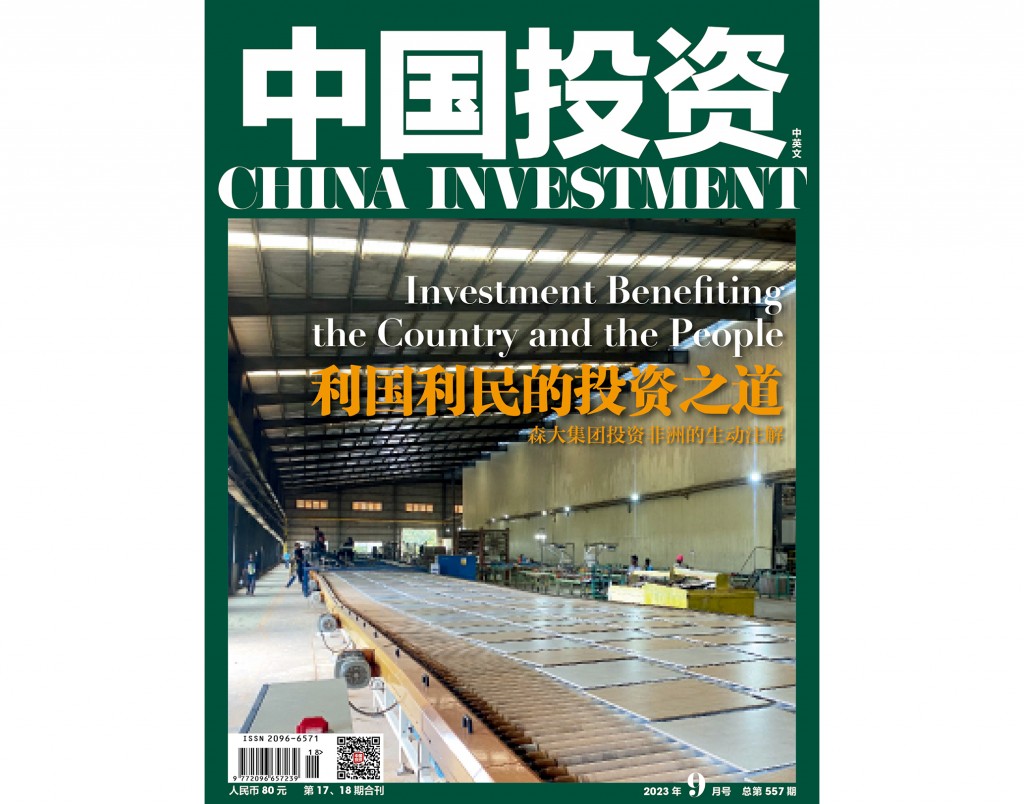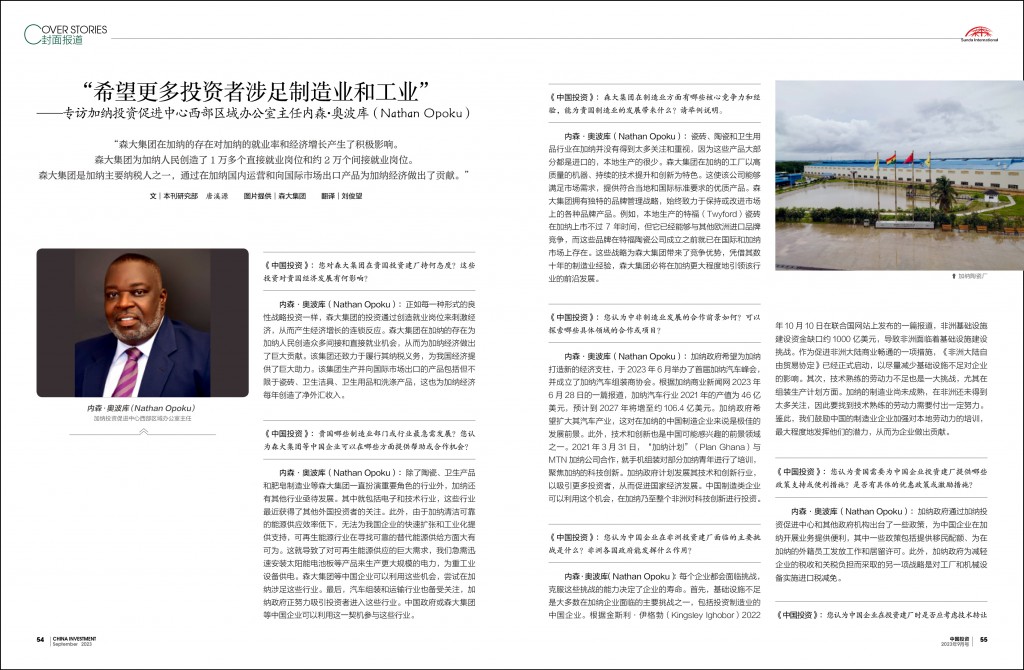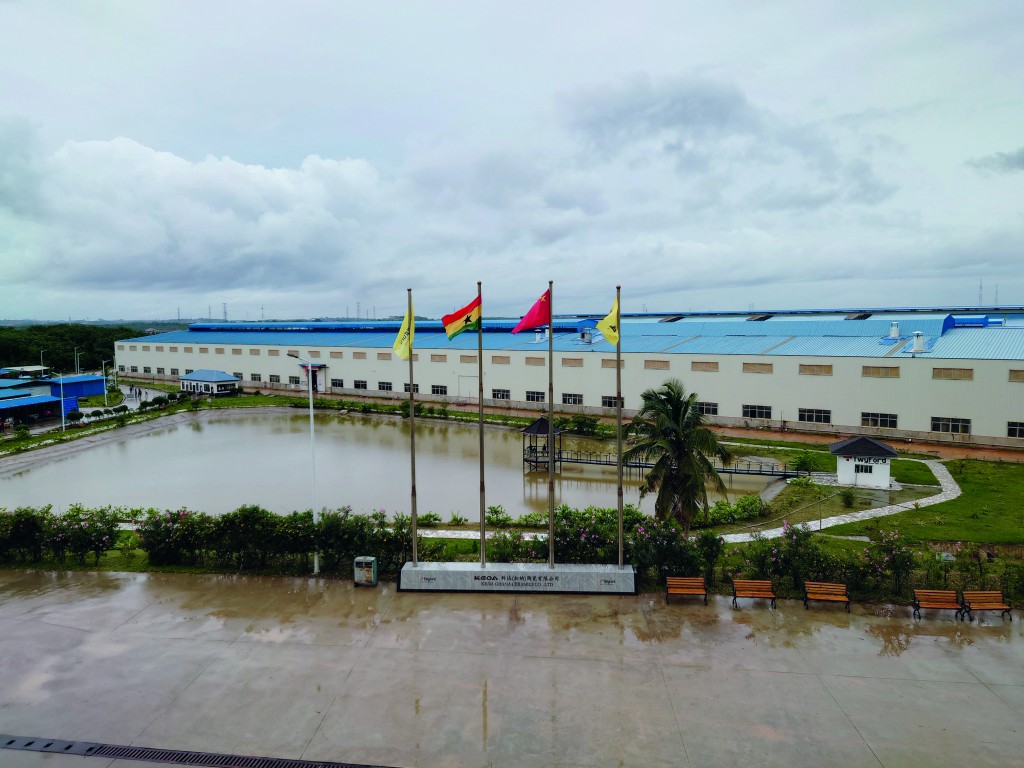
9月封面报道
利国利民的投资之道
● 产业金融深度融合 赋能优质中非制造——专访南非标准银行中非业务客户经理周蓓 / 唐溪源
● 渠道加技术的双重优势——专访科达(肯尼亚)陶瓷有限公司总经理李瑞钦/ 唐溪源
● “希望更多投资者涉足制造业和工业”——专访加纳投资促进中心西部区域办公室主任 / 唐溪源
● 在森大工作的学习与成长——专访森大集团肯尼亚陶瓷厂采购经理彼得·姆琼巴(Peter Mjomba)、森大集团加纳分公司合作事务与人力资源总监大卫·耶乌伽博士(Dr. David Yevugah) / 唐溪源
文|本刊研究部 唐溪源 图片提供|森大集团 翻译|刘俊望
导读

⬆ 内森·奥波库(Nathan Opoku),加纳投资促进中心西部区域办公室主任
《中国投资》:您对森大集团在贵国投资建厂持何态度?这些投资对贵国经济发展有何影响?
内森·奥波库(Nathan Opoku):正如每一种形式的良性战略投资一样,森大集团的投资通过创造就业岗位来刺激经济,从而产生经济增长的连锁反应。森大集团在加纳的存在为加纳人民创造众多间接和直接就业机会,从而为加纳经济做出了巨大贡献。该集团还致力于履行其纳税义务,为我国经济提供了巨大助力。该集团生产并向国际市场出口的产品包括但不限于瓷砖、卫生洁具、卫生用品和洗涤产品,这也为加纳经济每年创造了净外汇收入。
《中国投资》:贵国哪些制造业部门或行业最急需发展?您认为森大集团等中国企业可以在哪些方面提供帮助或合作机会?
内森·奥波库(Nathan Opoku):除了陶瓷、卫生产品和肥皂制造业等森大集团一直扮演重要角色的行业外,加纳还有其他行业亟待发展。其中就包括电子和技术行业,这些行业最近获得了其他外国投资者的关注。此外,由于加纳清洁可靠的能源供应效率低下,无法为我国企业的快速扩张和工业化提供支持,可再生能源行业在寻找可靠的替代能源供给方面大有可为。这就导致了对可再生能源供应的巨大需求,我们急需迅速安装太阳能电池板等产品来生产更大规模的电力,为重工业设备供电。森大集团等中国企业可以利用这些机会,尝试在加纳涉足这些行业。最后,汽车组装和运输行业也备受关注,加纳政府正努力吸引投资者进入这些行业。中国政府或森大集团等中国企业可以利用这一契机参与这些行业。
《中国投资》:森大集团在制造业方面有哪些核心竞争力和经验,能为贵国制造业的发展带来什么?请举例说明。
内森·奥波库(Nathan Opoku):瓷砖、陶瓷和卫生用品行业在加纳并没有得到太多关注和重视,因为这些产品大部分都是进口的,本地生产的很少。森大集团在加纳的工厂以高质量的机器、持续的技术提升和创新为特色。这使该公司能够满足市场需求,提供符合当地和国际标准要求的优质产品。森大集团拥有独特的品牌管理战略,始终致力于保持或改进市场上的各种品牌产品。例如,本地生产的特福(Twyford)瓷砖在加纳上市不过 7 年时间,但它已经能够与其他欧洲进口品牌竞争,而这些品牌在特福陶瓷公司成立之前就已在国际和加纳市场上存在。这些战略为森大集团带来了竞争优势,凭借其数十年的制造业经验,森大集团必将在加纳更大程度地引领该行业的前沿发展。
《中国投资》:您认为中非制造业发展的合作前景如何?可以探索哪些具体领域的合作或项目?
内森·奥波库(Nathan Opoku):加纳政府希望为加纳打造新的经济支柱,于2023年6月举办了首届加纳汽车峰会,并成立了加纳汽车组装商协会。根据加纳商业新闻网2023年6月28日的一篇报道,加纳汽车行业2021年的产值为46亿美元,预计到2027年将增至约106.4亿美元。加纳政府希望扩大其汽车产业,这对在加纳的中国制造企业来说是极佳的发展前景。此外,技术和创新也是中国可能感兴趣的前景领域之一。2021年3月31日,“加纳计划”(Plan Ghana)与 MTN 加纳公司合作,就手机组装对部分加纳青年进行了培训,聚焦加纳的科技创新。加纳政府计划发展其技术和创新行业,以吸引更多投资者,从而促进国家经济发展。中国制造类企业可以利用这个机会,在加纳乃至整个非洲对科技创新进行投资。
⬆ 加纳科达陶瓷生产车间
《中国投资》:您认为中国企业在非洲投资建厂面临的主要挑战是什么?非洲各国政府能发挥什么作用?
内森·奥波库(Nathan Opoku):每个企业都会面临挑战,克服这些挑战的能力决定了企业的寿命。首先,基础设施不足是大多数在加纳企业面临的主要挑战之一,包括投资制造业的中国企业。根据金斯利·伊格勃(Kingsley Ighobor)2022年10月10日在联合国网站上发布的一篇报道,非洲基础设施建设资金缺口约1000亿美元,导致非洲面临着基础设施建设挑战。作为促进非洲大陆商业畅通的一项措施,《非洲大陆自由贸易协定》已经正式启动,以尽量减少基础设施不足对企业的影响。其次,技术熟练的劳动力不足也是一大挑战,尤其在组装生产计划方面。加纳的制造业尚未成熟,在非洲还未得到太多关注,因此要找到技术熟练的劳动力需要付出一定努力。鉴此,我们鼓励中国的制造业企业加强对本地劳动力的培训,最大程度地发挥他们的潜力,从而为企业做出贡献。
《中国投资》:您认为贵国需要为中国企业投资建厂提供哪些政策支持或便利措施?是否有具体的优惠政策或激励措施?
内森·奥波库(Nathan Opoku):加纳政府通过加纳投资促进中心和其他政府机构出台了一些政策,为中国企业在加纳开展业务提供便利,其中一些政策包括提供移民配额、为在加纳的外籍员工发放工作和居留许可。此外,加纳政府为减轻企业的税收和关税负担而采取的另一项战略是对工厂和机械设备实施进口税减免。
⬆ 加纳仓储
《中国投资》:您认为中国企业在投资建厂时是否应考虑技术转让和当地产业发展?您认为贵国在这方面应提供哪些支持或指导?
内森·奥波库(Nathan Opoku):是的,我鼓励中国企业考虑在加纳进行技术转让。技术转让将有助于扩大加纳制造业本地劳动力的技能组合。技术转让将最大限度地提高本地劳动力的生产力,从而增加利润。 加纳投资促进中心的法务部门负责技术转让协议,这是我们职责之一,大多数企业都利用技术转让协议来保护其知识产权。
《中国投资》:森大集团在社会责任方面有哪些具体措施或贡献?特别是在就业、员工培训、工人福利、慈善和环境保护等方面是否有相关的举措或项目?
内森·奥波库(Nathan Opoku):森大集团在加纳承担了许多企业社会责任,例如,为其所在的社区提供水和厕所设施,为各类学校、社区、政府机构、医院等捐赠瓷砖和现金。森大集团在就业和员工培训方面亦开展了多项活动。最近,森大集团为培养我国年轻人才,推出了毕业生培训计划,让应届毕业生接受制造技术方面的高强度培训,并在培训结束后就业。此外,森大集团还为本地劳动力开设中文培训,学员们对此反响非常热烈。森大集团还为员工提供极具吸引力的福利,比如医疗保障、继续教育赞助和员工住宿。
《中国投资》:您认为中国企业在非洲投资建厂能否促进当地经济多元化和产业结构升级?如果是,您能列举哪些具体原因或案例?
内森·奥波库(Nathan Opoku):森大集团的制造企业为加纳人提供了众多就业机会,这又相应地助力本地区经济的多元化发展。例如,加纳西部和中部地区的某些郊区因采矿和原材料运输而创造了大量就业岗位,从而为当地居民创造了就业机会。同样,生活在这些制造企业周边地区的人们有接触到该行业的机会,这会使更多的人投身于与制造业相关的行业。加纳的农业和非农业生产活动对经济的影响众所周知。我建议森大集团尝试涉足其他行业。
《中国投资》:您认为中国企业在非洲投资建厂时,是否应注重当地员工的培训和提升?是否有培训计划或机制?
内森·奥波库(Nathan Opoku):加纳投资促进中心鼓励森大集团和所有其他中国制造企业重视当地员工的培训和提升。加纳拥有充满活力的年轻人,他们非常勤奋,愿意通过学习不断提升自己。培训很重要,因为它可以为员工提供自我提升的机会,并提高员工的工作效率。
《中国投资》:对于在非洲投资建厂的中国企业,您认为在促进可持续发展和环境保护方面应注意哪些问题、采取哪些措施?
内森·奥波库(Nathan Opoku):毫无疑问,可持续发展和环境保护对每个企业来说都是关键因素。加纳投资促进中心不赞成企业违反环保局的规定,因此我们鼓励每家企业在环保局规定的范围内运营。我们还鼓励森大集团推动安全采矿,不断敦促其材料供应商开展有效的土地复垦活动,避免在距离河流较近的地方采矿,以促进我国的环境可持续和发展。
《中国投资》:您认为在非洲投资建厂的中国企业是否能成为促进当地就业和经济增长的重要力量?是否有数据或案例支撑这一观点?
内森·奥波库(Nathan Opoku):加纳投资促进中心的核心任务之一是促进和吸引对加纳的投资。我们知道,这将促进本地区就业并刺激经济增长,经济指标也证明了这一点。森大集团在加纳的存在对加纳的就业率和经济增长产生了积极影响。森大集团为加纳人民创造了1万多个直接就业岗位和约2万个间接就业岗位。森大集团是加纳主要纳税人之一,通过在加纳国内运营和向国际市场出口产品为加纳经济做出了贡献。
《中国投资》:在贵国,中国企业投资建厂是否受到当地社区的欢迎和支持?是否有相关的社区参与一些计划或项目?
内森·奥波库(Nathan Opoku):加纳人天生热情好客。我们始终支持真正来做生意的外国人,而不是违反环境法规和公司条例的企业。我们热烈欢迎中国公司来加纳,并在产品赞助方面提供了我们最大的支持。我们为包括中国人在内的所有外国人在加纳工作和生活创造和平和良好的环境,只要他们从事的是合法的业务。
《中国投资》:您认为中国企业在非洲投资建厂是否会带来技术升级和产业链延伸的机会?如果是,是否有具体的做法或案例可以分享?
内森·奥波库(Nathan Opoku):会的。加纳的制造业还很年轻,但加纳政府已制定了“一区一厂”等政策和制度,以吸引更多投资者涉足制造业和工业。目前,我们大多数院校都开设了与制造业直接相关的学位和专业课程,如工业或制造工程、计算机科学和机械工程等,以扩大我们的技术劳动力队伍,并通过培训让他们掌握在制造业任职所需的技能。加纳投资促进中心相信,如果中国制造企业继续保持目前在加纳的扩张速度,那么劳动力将大规模地向制造业倾斜,并将吸引其他外国投资者效仿,因为该行业将有更多的高技能劳动力。例如,本地化项目就非常成功,在过去两年里,仅该项目就通过技术和管理技能转让让40多名加纳人担任了不同的管理职位。该项目的目标就是让加纳人取代大多数中国人担任管理职位。
《中国投资》:最后,请谈谈您对中非制造业合作发展的期待和建议。
内森·奥波库(Nathan Opoku):自2009年以来,中国一直是非洲最大的贸易伙伴。2022年,中国仍是非洲最大的贸易伙伴,为非洲经济注入超过1550亿美元。我们的期望是,中国政府和企业不应只关注制造业。还有一些大有潜力的行业,比如科技行业、建筑业、运输业、农业和能源行业,这些行业都亟待发展。

⬆ Mr. Nathan Opoku,Western Regional Head,GIPC
Western Regional Office, Ghana Investment Promotion Centre.
China Investment: What is your attitude toward Sunda Group’s investment in manufacturing plants in your country? What impact have these investments had on the economic development of your country?
Nathan Opoku:As every form of good and strategic investment does, it creates a ripple effect of economic growth by stimulating the economy through employment & job creation. The presence of Sunda Group in Ghana has contributed significantly to the economy of Ghana, through the creation of multiple direct and indirect jobs for the people of Ghana. The group has also been committed to its tax payment obligations, which has been a massive support to the economy of the country. Manufacturing and exporting of products including but not limited to ceramic tiles, sanitary wares, sanitary products, and washing products to the international market is also a net positive to the foreign exchange earnings that generate into the Ghanaian economy annually.
China Investment: Which manufacturing sectors and industries are most in need of development in your country? In what ways do you think Chinese companies, such as Sunda Group, can offer help or cooperation opportunities?
Nathan Opoku:Apart from the ceramic, sanitary products, and soap manufacturing industry of which Sunda Group has been one of the key players; there are other sectors, which are need of urgent development. Some of these sectors include the electronics and technological industry, which has recently gained the attention of other foreign investors in the country. In addition, the renewable energy sector has become promising in finding alternative sources of reliable energy supply in Ghana due to inefficient supply of clean and reliable energy to support the rapid expansion of companies and industrialization in the country. This has resulted in the massive demand for renewable energy supply as an immediate intervention in the likes of solar panels to generate electricity on a higher scale to power heavy industrial equipments. Chinese companies such as Sunda Group could leverage on these opportunities to venture into one of these sectors in Ghana. Finally, the automotive assembly and transporting sector has gained significant attention, as the government of Ghana is seeking to attract investors into the sector. The Chinese government or companies as Sunda Group could take advantage of this initiate to partake in these sectors.
China Investment: What core competitiveness and experience does Sunda Group have in manufacturing, and what can it bring to the development of manufacturing industry in your country? Please give an example.
Nathan Opoku:The tiles, ceramics and sanitary product industry has not gain much focus and attention in Ghana, as most of these products are imported and few produced locally. Sunda factories in Ghana are characterized by high quality machines, and consistent technological improvement and innovation. This enables the organisation to meet the market demand and deliver quality products that meets both local and international standards and requirements. Sunda Group has a unique brand management strategy that always seek to maintain or improve the various brands of products on the market. For instance, the locally manufactured twyford tile is barely 7 years in Ghana; however, it has been able to compete with other imported European brands, which existed on the international and Ghanaian market before the inception of the twyford ceramic company. These strategies give Sunda Group a competitive advantage and with its decades of experience in the manufacturing industry, could lead the frontier into this industry on a much larger scale in the country.
China Investment: In your opinion, what is the prospect of cooperation between China and Africa in manufacturing development? What specific areas of cooperation or projects could be explored?
Nathan Opoku:The government of Ghana in its quest to create new economic backbone for Ghana held a maiden edition of Ghana Automotive summit in June, 2023 and inaugurated the Automobile Assemblers Association of Ghana (AAAG). According to a publication by Ghana Business news on June 28, 2023, the automobile industry of Ghana was valued at $ 4.6 billion in 2021 and is expected to increase to about $10.64 billion by 2027. The government of Ghana wishes to expand its automotive industry, and hence this is a very good prospect for the Chinese manufacturing companies in Ghana to consider for future development. In addition, technology and innovation is one of the prospect areas that could be of interest to China. On March 31, 2021, Plan Ghana and MTN Ghana collaborated to train some Ghanaian youths in mobile phone assembling to focus on technology and innovations in the country. The Government of Ghana intends to expand its technology and innovation sector to attract more investors to boost the economy of the country. Chinese manufacturing companies could take advantage of this opportunity to invest in technology and innovations in Ghana and Africa as a whole.
China Investment: What do you think are the main challenges Chinese companies face in investing in manufacturing plants in Africa? What is the role of African governments?
Nathan Opoku:In every business, there are challenges, and the ability to overcome these challenges determines the longevity of the business. First and foremost, infrastructure deficits is one of the major challenges that is faced by most companies in Ghana, including Chinese companies investing in the manufacturing industry. According to a publication by Kingsley Ighobor on October 10, 2022 on un.org, there is an infrastructure challenge in Africa due to a funding gap of about $100 billion for its infrastructural development. As an intervention to facilitate smooth flow of business on the continent, the African Continental Free Trade has been initiated to minimize the effect of infrastructure deficit on businesses. Secondly, inadequate technically skilled workforce in the manufacturing sector is also a major challenge, especially in assembling these manufacturing plans. The manufacturing sector in Ghana is much younger and has not gained much attention in Africa, hence it requires a bit of an effort to find technically skilled workforce. In view of this, we encourage Chinese companies in the manufacturing industry to intensify training of our local workforce to maximize their potentials and contribution to their companies.
China Investment:What policy support or facilitation measures do you think your country needs to provide for Chinese enterprises to invest in manufacturing plants? Are there any specific preferential policies or incentives?
Nathan Opoku:The government of Ghana through the GIPC and other government agencies have introduced some policies to facilitate business operations by Chinese enterprises in Ghana. Some of these policies include automatic immigration quota, issuing of work and residence permit for expatriate employees in Ghana. In addition, another strategy adopted by the government of Ghana to ease tax and duty obligations by companies is the introduction of import duty exemptions on plants and machinery equipment.
China Investment: Do you think Chinese companies should consider technology transfer and local industry development when investing in manufacturing plants? What kind of support or guidance do you think your country should provide in this regard?
Nathan Opoku:Yes, I would encourage Chinese companies to consider technology transfer in Ghana. Technology transfer would help expand the skill set of the local workforce in the manufacturing industry in Ghana. Technology transfer would maximize the productivity of the local workforce thereby increasing profit. We at GIPC as part of our mandate through our Legal department is in charge of Technology Transfer Agreements (TTA’s) which most companies have taken advantage of to protect their intellectual properties.
China Investment: What specific measures or contributions does Sunda Group have in terms of social responsibility? Are there any relevant initiatives or projects, particularly in the areas of employment, employee training, worker welfare, charity and environmental protection?
Nathan Opoku:Sunda group has undertaken many corporate social responsibilities in Ghana, for example, providing water and toilet facilities to the community they operate in, donating tiles and cash to various schools, communities, government institutions, hospitals, etc. Sunda group has embarked on several activities in the area of employment and employee training. Recently, Sunda group in its quest to develop young talent in the country has introduced the graduate trainee program where fresh graduates undergo intensive traing in the manufacturing technology, and subsequently employed after the traing. Sunda group has also introduced the Chinese language training for the local workforce, which has seen a very positive response from the participants so far. Sunda also provides very attractive welfare for its employees such as medical care, further education sponsorship and accommodation for workers.
China Investment: Do you think that Chinese enterprises investing in manufacturing plants in Africa can promote the diversification of local economy and the upgrading of industrial structure? If so, what specific reasons or examples can you share?
Nathan Opoku:Sunda group manufacturing companies provides a very long chain of employment opportunities for Ghanaians, which in turn helps to diversify the local economy. For instance, certain suburbs of Western, and Central region of Ghana has received multiple job creation due to mining and hauling of raw materials in these areas, resulting in job creation for the indigenous people. Again, people living in the catchment of these manufacturing companies have been exposed to opportunities in the industry, amounting to an increased number of people venturing into businesses related to the manufacturing industry. Ghana is well noted for its agriculture and non-farming production activities that affect economy. I suggest Sunda group venture into other businesses.
China Investment: Do you think Chinese companies should focus on training and upgrading local employees when investing in manufacturing plants in Africa? Is there a training program or mechanism?
Nathan Opoku:GIPC would encourage Sunda group and all other Chinese manufacturing companies to focus on training and upgrading its local employees. Ghana has a very vibrant and youthful population who are very industrious and willing to learn to upgrade themselves. The importance of training lies in the opportunities to strengthen your employees. Training allows your employees to become more effective.
China Investment: For Chinese enterprises investing in manufacturing plants in Africa, what issues and measures do you think should be paid attention to in promoting sustainable development and environmental protection?
Nathan Opoku:Most definitely, sustainable development and environmental protection are key factors to every business. We at GIPC frown upon companies going against EPA regulations, hence we encourage every company to operate within the confines of the Environmental Protection Agency’s regulations. We also encourage Sunda group to promote safe mining by constantly engaging its material suppliers to embark on effective land reclamation exercises, avoid mining in shorter proximity to river bodies to promote environmental sustainability and development in the country.
China Investment: Do you think Chinese companies investing in manufacturing plants in Africa can be an important force to promote local employment and economic growth? Is there any data or case to support this?
Nathan Opoku:At GIPC one of our core mandate is to promote and attract investments into Ghana. This we know will promote local employment and stimulate economic growth. The economic indicators prove it. The presence of Sunda group in Ghana has influenced positively on employment rate and economic growth in Ghana. Sunda group has created more than 10,000 direct jobs for the people of Ghana and about 20,000 indirect jobs. Sunda group is one of the leading taxpayers in Ghana, contributing to the economy of Ghana through its internal operations and exportation of its products on the international market.
China Investment: In your country, are Chinese companies investing in manufacturing plants welcomed and supported by local communities? Whether there are relevant community engagement programs or projects?
Nathan Opoku:Ghanaians are welcoming people by nature. We always support foreigners who come in to do genuine business, not businesses that violate Environmental Regulations and Corporate Regulations. We warmly welcome Chinese companies in Ghana and have provided our maximum support in terms of product patronage, and creating very peaceful and sound environment for all foreigners including Chinese to work and live in Ghana provided they do legal businesses.
China Investment: Do you think Chinese companies investing in manufacturing plants in Africa will bring opportunities for technological upgrading and industrial chain extension? If so, is there any specific practice or case to share?
Nathan Opoku:Yes it will. The manufacturing industry is very young in Ghana, however, the government of Ghana has put in place policies and systems such as One District One Factory ( 1D1F) to attract more investors to venture into manufacturing and industrialization. Most our institutions are currently offering degree and professional programs that has direct relevance in the manufacturing industry such as industrial or manufacturing engineering, computer science, and mechanical engineering to expand our skilled workforce and to also train them with the requisite skills to take up roles in the manufacturing industry. We at GIPC believe that, should the current rate of expansion of Chinese manufacturing companies in Ghana continue, there would be a massive tilt towards to the positive direction workforce in the manufacturing industry, and would attract other foreign investors to follow suit since there would be more, highly skilled workforce for the industry. For example the localization project is very successful, which alone has put more than 40 Ghanaians into different managerial positions in the past two years through technology and managerial skills transfer. The aim of this project is to replace majority Chinese by Ghanaians in the management positions in the future.
China Investment: Finally, please share with us your expectations and suggestions for the China-Africa cooperation in manufacturing development?
Nathan Opoku: China has been Africa’s largest trading partner since 2009 and China remains the largest trading partner as of 2022, with over $155 billion injected into the African economy. Our expectation is that, Chinese government and companies should not focus only on the manufacturing sector. There are potentially viable sectors like the Tech industry, construction industry, transportation industry, agriculture industry, and the energy sector, which are in dire need of development.






